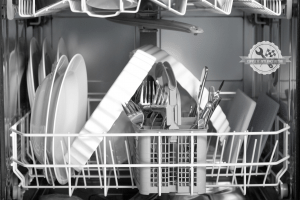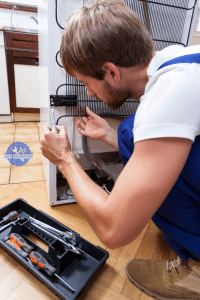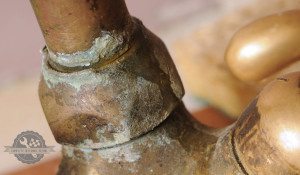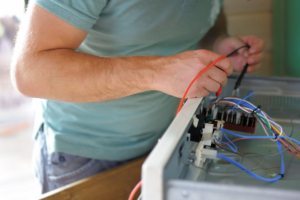Here on the Complete Appliance Repair blog, we want to help you make the most of all of your appliances. Whether that means helping identify a needed repair, or walking you through a simple repair you can do on your own, we’re here to help. We also want to help you maintain and use your appliances in the best possible way. So today we’re sharing 10 awesome dishwasher tips with you!
10 Awesome Dishwasher Tips:
Remove food
The first of 10 awesome dishwasher tips is to remove as much food as possible before putting your dishes in the dishwasher.. Just take a second when you’ve finished eating to scrape the food into the garbage or down the disposal. This will help you to avoid getting less food caught in your dishwasher filter.
Pre-rinsing
Pre-rinsing is a personal decision based on your dishwasher and the type of detergent you use. Some detergents are made to remove residue, and others aren’t. Find what works for you! Generally you plan to rinse oily dishes. It’s also a good idea to pre-rinse if you’re not going to be running your dishwasher very often.
Detergent
Like tip number two, this is going to be a based on your personal preference. There’s no right or wrong answer, just try a detergent and see how it works for your dishes and your dishwasher.
Loading
Of the ten awesome dishwasher tips we have for you today, this one is probably the most  awesome and most under-appreciated. How you load your dishwasher makes a big difference when it comes to cleanliness. Plates should be loaded on the bottom rack with the dirty side facing in. Try to stagger your large and small plates. Pots and pans also go on the bottom facing down. Your cutlery goes in the cutlery holder facing up, except your knives if you’re worried about cutting your hand. Cups, glasses and bowls go on your top rack facing down so they don’t collect water. Plastic containers and large utensils also go on the top rack. Bigger items like baking sheets, platters, or cutting sheets sit on the sides or back of the bottom rack. Never block the detergent or water dispenser, and avoid overloading your dishwasher.
awesome and most under-appreciated. How you load your dishwasher makes a big difference when it comes to cleanliness. Plates should be loaded on the bottom rack with the dirty side facing in. Try to stagger your large and small plates. Pots and pans also go on the bottom facing down. Your cutlery goes in the cutlery holder facing up, except your knives if you’re worried about cutting your hand. Cups, glasses and bowls go on your top rack facing down so they don’t collect water. Plastic containers and large utensils also go on the top rack. Bigger items like baking sheets, platters, or cutting sheets sit on the sides or back of the bottom rack. Never block the detergent or water dispenser, and avoid overloading your dishwasher.
Rinse agent
A rinse agent helps to dry your dishes and reduce water spots. It also helps to rinse away any excess detergent and food residue. You may use a rinse agent of your choice or you can try using vinegar instead which will work just as well.
Dishwasher no’s
There are a few things that should never go in your dishwasher and are much better off being hand washed. The first are your good knives. Putting them in the dishwasher can make them dull and rusty. You should also keep your insulated cups, and silver, gold or silver/gold plated items out of the dishwasher. Delicate crystal should always be hand washed. Don’t put disposable plastic containers or aluminum in your dishwasher, and you should never put your cast iron and non-stick cookware in either. Wash your wooden utensils by hand to avoid splitting the wood.
Load as you go
Make life easier on yourself and load your dishwasher as you go. Instead of moving your dishes from the table to the counter to the sink to the dishwasher, go straight for the dishwasher! It’ll keep your kitchen less cluttered and make cleaning up a snap.
Use the correct cycle and detergent
You might think more detergent means cleaner dishes, but that is definitely not the case. Too much soap means buildup on your plates and in your dishwasher. Use the recommended amount of detergent and use the correct cycle. Doing so will save your water and keep your dishwasher efficient.
Make good habits
Following all of these 10 awesome dishwasher tips will set you up to form good habits. But you should also specifically develop a good ritual when it comes to running your dishwasher. For example, you can run the dishwasher at night and unload first thing in the morning. Or start it as you leave the house and unload when you get home from work. Whatever you decide, stick with it!
Run hot water first
Last but not least, run hot water in the sink for a few minutes before starting your dishwasher to get hot water flowing. That way the water in your dishwasher will start out nice and steamy!
Hopefully these 10 awesome dishwasher tips make your dish cleaning experience more effective and efficient. If you suspect your dishwasher needs a repair, don’t hesitate to call Complete Appliance Repair today!


 hassle. Today we’ve got some tips for you that will help you navigate your refrigeration repairs, and decide when it’s time to call it quits.
hassle. Today we’ve got some tips for you that will help you navigate your refrigeration repairs, and decide when it’s time to call it quits. When these are heated up, they leave the water and encrust on your shower head as a mineral deposit.
When these are heated up, they leave the water and encrust on your shower head as a mineral deposit. cost you money for lost goods as well as repairs. An outage of your refrigerator, for example, can result in hundreds of dollars in spoiled food. In the Salt Lake City area, Complete Appliance Repair and Service is your go-to solution when appliances go on the fritz.
cost you money for lost goods as well as repairs. An outage of your refrigerator, for example, can result in hundreds of dollars in spoiled food. In the Salt Lake City area, Complete Appliance Repair and Service is your go-to solution when appliances go on the fritz.